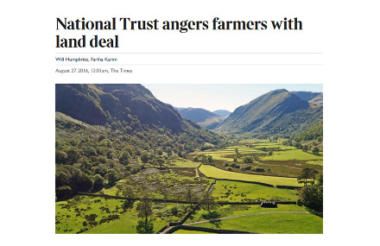The National Trust has been accused of “dictatorial bullying” in The Times newspaper this morning over the “disgraceful purchase” of a farm in the Lake District.
In a letter to The Times, broadcaster Lord Bragg said the Trust’s recent acquisition of Thorneythwaite Farm was a “nasty piece of work”.
The sheep farm is part of an agricultural tradition dating back 4,500 years - and currently home to a rare breed of Herdwick sheep which were rescued from extinction with the help of Beatrix Potter.
'Mafia tactics'
According to Bragg, local shepherds and farmers were hoping to purchase the land to continue its use as a working farm – but were gazumped at auction by the Trust.
Part of Bragg’s criticism centres around the Trust’s opening bid of £200,000 more than the £750,000 guide price in an effort to deter other bidders – tactics “straight out of the mafia”, he said.
“What makes them think they know best? It seems the head of the trust is behaving very dictatorially,” Bragg said this morning.
“Had a billionaire bullied his way into this disgraceful purchase there would have been a deserved outcry. The National Trust considers itself beyond criticism and has behaved very badly.”
'Increasingly arrogant'
Bragg called for director-general of the National Trust, Dame Helen Ghosh, to put things right. He added, the key reason for the Lake District’s nomination as a Unesco world heritage site, was due to its historic farming system and sheep, including the Herdwicks at Thorneythwaite Farm.
“If the increasingly arrogant National Trust is there to protect anything of our past surely this is a prime example,” he said.
A spokeswoman for the Trust told Civil Society News that the 303 acres of land would "now be looked after for ever, for everyone".
"We bid for this land because it offers such amazing places for wildlife including woodland featuring veteran trees, riverside fields, open craggy fell and wood pasture," she said.
"The land was split into two plots by the auctioneers: the farm land and a farm house. The Trust used its charitable funds to bid for the land rather than the building."
Bigger picture
The spokeswoman said the land would benefit from the Trust's "big picture" vantage.
"We believe we can look after this land in way which benefits nature, our visitors and the local community. Managing much of the surrounding land in Borrowdale means we can take a ‘big picture’ view of how we manage the wider landscape, and it allows us to focus on delivering healthy soil, natural water management, thriving natural habitats and continued public access."
The spokeswoman said the Trust declined to buy the farmhouse that accompanied the land, due to "limited funds".
"Managing the land is the best way for us to secure the long term future health of this special landscape, given our available resources."
She said the Trust has not yet come to a decision over how the land will be managed but "may seek one or more tenants" to work alongside.
"We will be developing more detailed plans over the coming months," she said.
According to The Times, several of its readers have vowed not to renew their National Trust membership in protest over the purchase.
The Trust has not confirmed what will happen to its newly acquired sheep.








